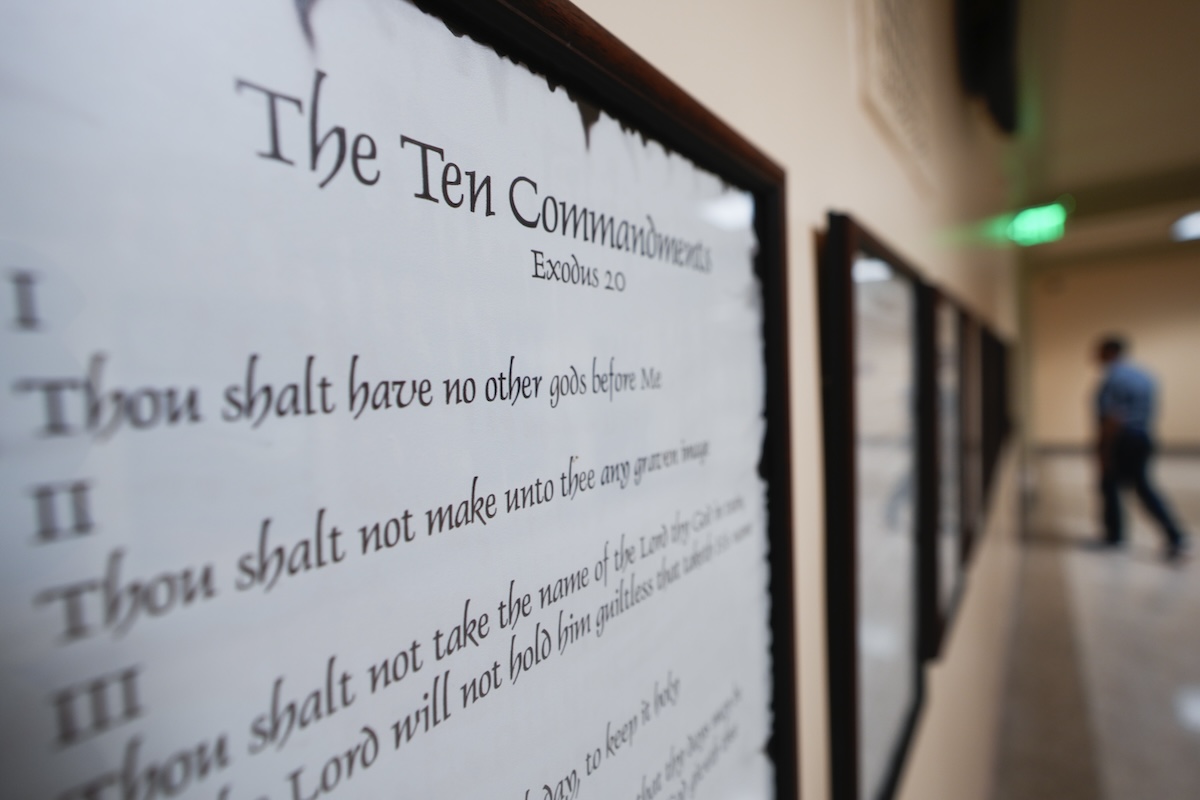The Louisiana legislature is about to pass a bill that would require every public school in the state to post the Ten Commandments in each classroom. The bill’s author, Rep. Dodie Horton, explained that the “purpose [of the law] is not solely religious” but also serves to “display the history of our country and foundation of our legal system.”
On cue, the disestablishmentarians took immediate issue with the bill, arguing that it was synonymous with theocratic indoctrination. As an attorney from the ACLU put it, ”Public schools shouldn’t be used to religiously indoctrinate or convert students.” Some unsuspecting non-Christian students may see one of these posters, ponder its implications, and literally come to Jesus.
One can only hope! But the greater likelihood is that they will see it as just more clutter on teachers’ already busy walls, next to the Gandhi and Malcolm X posters, across the from the motivational Garfield poster, and right behind the state, national, and Pride flags up front. Perhaps some conservative teachers might try to use it to tame their less civilized classes, while some progressive teachers will see it as yet another reason to whine about the stupid conservatives running their state.
But most teachers will probably post it on their walls … and ignore it—much like they do with posters of learning objectives, school mission statements, bullying hotlines, and all the other meaningless content mandated from on high. Somehow, miraculously, the response to the dysfunction of public schools is supposed to be remedied by one more visual that indirectly encourages them to make better choices.
None of this is to say that the critics are right. Nor is this to say that the idea behind the bill is wrong. Rather, it is to say that, as it stands, the bill does not go far enough in addressing the moral illiteracy plaguing public schools.
Along with their innumerable academic deficiencies, too many of today’s students are selfish, shortsighted, irrational, and utterly superficial. They fail to recognize that all actions have consequences, that other people have feelings too, and that they are ultimately responsible for the way they behave. Many of them struggle to differentiate between right and wrong, good and bad, truth and falsehood. Even a good number of juniors and seniors whom I work with in Advanced Placement English classes will draw a blank when encountering the words “virtue” and “vice.”
Naturally, this carries significant implications for their education on multiple fronts. In some cases, schools descend into a “Lord of the Flies”–style anarchy where students brutalize one another, as frequently happens in Louisiana’s urban campuses. In other instances, high-achieving students will lie and cheat their way to the top, only to fail miserably when they leave the permissive, grade-inflating environments of school and college.
But the usual outcome of having a morally illiterate student population is that most of them will completely disengage from reality and retreat into fantasies of their own making. Nothing about school—learning basic skills, winning honor and praise, earning the requisite employment credentials, making friends, falling in love—interests them in the slightest. This in turn makes them anti-social, unambitious, and generally sad.
That might be the reason Rep. Horton wrote the law. If these kids lack meaning and guidance in their lives, then maybe seeing the Ten Commandments everywhere will steer them toward a better kind of life. Maybe they’ll stop worshipping idols (i.e., money, fame, power), using profanity, stealing property, hurting their neighbors, and having premarital sex. Maybe they’ll realize that following God’s main directives will make them happier and more grateful to be alive. After all, if public schools aren’t teaching these values, then someone or something else will fill the moral void and corrupt them.
Or Horton and her colleagues could simply be virtue-signaling to their constituents. After all, it doesn’t seem fair that progressive politicians can win political points for flying rainbow flags and commissioning BLM murals while conservative politicians are expected to do something constructive to win support.
Whatever the motivation behind the bill, it’s doubtful it will make any impact, and it could easily backfire. Christian parents who follow the Ten Commandments will still likely resent public schools appropriating religious teachings for secular purposes (as evidenced by the Catholic state senator from New Orleans opposing the bill), and non-Christian parents will feel implicitly judged and excluded by such posters. Even if supporters of the bill insist that no religions are being established and the posters are just used as teaching tools, it’s doubtful these points will change anyone’s mind.
More importantly, debating the constitutionality of the bill avoids the real crisis afflicting students in public schools. It’s not so much that they don’t know right from wrong (though this is obviously a problem); it’s that too many lack the very capacity to know right from wrong. Thinking morally and empathetically requires some degree of imagination, logic, and an ability to control one’s feelings—in other words, it requires maturity.
This is why most Christian churches usually wait until a child reaches “the age of reason” (usually seven or eight years old) before teaching things like the Ten Commandments and Christ’s parables. It’s not necessarily because adults are afraid of explaining what “adultery” means to toddlers, but because those toddlers wouldn’t understand the word even if it were explained to them. The same goes for other words like coveting, idols, Sabbath, or phrases like in vain or false witness.
Yet many kids (and adults) never get to this point in their maturity because they aren’t churched and they’re addicted to their screens. They lack models in their life who can show them how to live morally and, more importantly, why to live morally. They never develop the habits of thinking needed to internalize moral truths. Thus, rather than supposedly being liberated from the constraints of Christian morality or dogma, they become ever more vulnerable to every kind of ideology, superstition, and addiction that the modern world has to offer.
That said, Louisianan lawmakers should be commended for at least partially identifying the problem. This puts them ahead of most adults who usually ignore what’s happening with today’s youth. Nevertheless, they should change their approach and treat the disease, not the symptom. Accordingly, they should follow the lead of Governor Sarah Huckabee Sanders in the neighboring state of Arkansas, who has launched a crusade against smartphones. The fact that she is opposed by the swarms of Big Tech lobbyists wanting to keep kids addicted to their products shows that she is over the target. By contrast, only a few anti-Christian activists and lawfare operations are going to care about Ten Commandment posters in classrooms.
For the time being, it’s the screens and stunted maturity that are holding our students back, not an ignorance of God’s law. Reform will only happen when these issues are met head-on. As every teacher has personally experienced, “You can lead a horse to water, but you can’t make it drink.” But if the right efforts are made and the deeper problem is fixed, you can work to make that horse thirstier.

